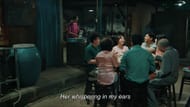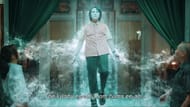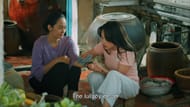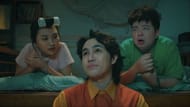The Ancestral Home is a Vietnamese family-horror dramedy that concludes with emotional release. The Ancestral Home follows Mỹ Tiên, a modern Gen Z content creator who returns to her ancestral house with the intent to film trendy spiritual content, only to reconnect with her late brother Gia Minh’s ghost.
Disclaimer: The article contains major spoilers for the film. Readers' discretion is advised.
While the film hints at eerie presences, it steers away from traditional horror. Instead, its ending affirms the power of family, memory, and reconciliation.
The house ultimately brings the family together, not by solving their problems, but by helping them face them honestly.
Directed by Huỳnh Lập in his much-anticipated return to cinema, the 2025 film balances gentle comedy and reflective storytelling with light supernatural themes.
Through Mỹ Tiên’s journey from skepticism to understanding, The Ancestral Home offers a depiction of Vietnam’s generational dynamics and cultural rituals.
Did the house bring the family together or reveal its deepest divides?

The house did both. It exposed the tensions that had long been ignored, conflicts over inheritance, misunderstandings between generations, and emotional wounds left unspoken.
However, it also created the space for healing. By bringing Mỹ Tiên back into the fold and allowing Gia Minh’s spirit to guide her, the house facilitated reconnection.
Gia Minh’s ghost wasn't there to scare anyone: it served as a reminder of what was lost and what could still be saved. Through shared rituals, storytelling, and small acts of kindness, the family is slowly brought back together.
The final ceremony hosted by Mỹ Tiên is less about tradition for tradition’s sake, and more about renewed respect and emotional honesty.
The house didn’t just hold their memories, it became the anchor that kept them from drifting apart.
Mỹ Tiên’s emotional arc in The Ancestral Home

At the heart of The Ancestral Home is Mỹ Tiên’s personal growth. Initially dismissive of traditions and focused on online clout, her encounter with Gia Minh reorients her values.
Through bonding with her brother’s ghost, whether it is through cooking rituals, music, or childhood memories, she rediscovers the importance of family legacy.
By the film’s end, Mỹ Tiên no longer sees the house as a relic but as a living part of her identity. Her decision to stay, lead ceremonies, and defend the property from relatives seeking profit signals emotional maturity.
The house is no longer a backdrop for her videos, it becomes a space of purpose and belonging.
Gia Minh’s role in the family’s healing

Gia Minh, played by director Huỳnh Lập himself, serves as a spiritual guide rather than a horror figure. His presence isn’t malicious: he is humorous, compassionate, and protective.
As a ghost, his mission is clear: ensure that The Ancestral Home is not destroyed by property disputes and forgotten traditions.
Throughout the story, he inhabits different family members to communicate, draws Mỹ Tiên into the spirit world, and reenacts old family routines.
These moments are rich with symbolism, showing how past and present can coexist through memory. Gia Minh’s spirit fades only after Mỹ Tiên understands the importance of what he was trying to protect.
How The Ancestral Home resolves the family conflict

The extended family dynamic plays a crucial role in the narrative. From disputes over property division to deep-rooted resentment, the house becomes a metaphorical battleground.
Yet, unlike many horror films that end with destruction, The Ancestral Home opts for reconciliation.
Mỹ Tiên acts as the catalyst for healing, often guided by Gia Minh’s spirit. Through conversations, rituals, and shared meals, the film allows each character’s grievances to surface and be acknowledged.
The result is a family that, while imperfect, is willing to remember, forgive, and preserve what truly matters.
Final thoughts on The Ancestral Home ending

The Ancestral Home is not a ghost story meant to frighten: it is a story about ghosts of memory, tradition, and family expectation.
Huỳnh Lập crafts a delicate blend of humor and heart, never letting supernatural elements overpower the film’s emotional truth.
Ultimately, the ending reassures viewers that healing is possible. The Ancestral Home doesn’t pass down a curse, it becomes a site of reconnection.
Mỹ Tiên’s journey shows that honoring one’s roots isn’t about the past haunting the present, but about giving the past space to rest.
